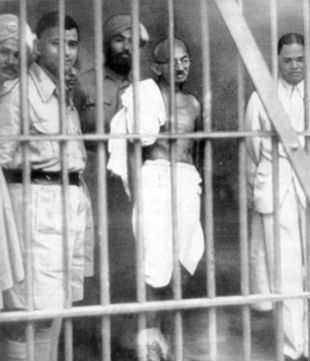January 17
 “No one commits crime for the fun of it.”
“No one commits crime for the fun of it.”
–Gandhi (Harijan, 11-2-1947)
In order to inflict violence on someone, we must first dehumanize them. For this reason, Gandhi maintained that words like “crime” and “criminal” should be erased from our vocabulary. These words help us write off the dignity of the human being and dehumanize certain persons before we subject them to the psychological and often physical violence of our incarceration systems.
Instead, if someone has violated some part of our social contract, we must find a way to understand why the act was committed. Was it an act of civil disobedience? Should we adjust the law? Is the person suffering trauma? What has been done to help that trauma? What caused it in the first place? How can we apply what’s called “restorative justice”?
Nonviolence is a force that heals. We must question any assumptions we or others might hold that people–or specific groups of people– want to do harm, and that the only way to “help” them is restraining or punishing them with violence. We have to replace that violent worldview with the nonviolent vision that reveals that all people, no matter what they have done to us, are worthy of dignity, and that we will accept nothing less.
Experiment in Nonviolence:
Talk to a friend or relative about restorative justice. Write down any questions or comments to which you lack a coherent response and do the research to strengthen your position in favor of it.
Daily Metta 2015, a service of the Metta Center for Nonviolence, is a daily reflection on the strategic and spiritual insights of Mahatma Gandhi in thought, word and deed. As Gandhi called his life an “experiment in truth,” we have included an experiment in nonviolence to accompany each Daily Metta. Check in every day for new inspiration. Each year will be dedicated to another wisdom teacher.








